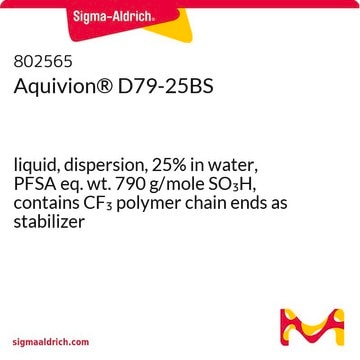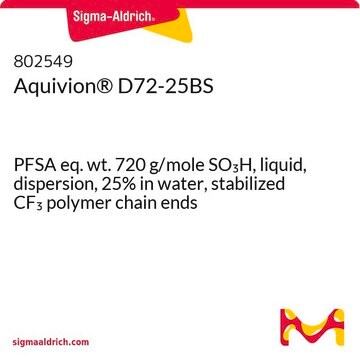802557
Aquivion® D98-25BS
liquid, dispersion, 25% in water, PFSA eq. wt. 980 g/mole SO3H, contains CF3 polymer chain ends as stabilizer
Synonym(s):
Aquivion® SO3H-form, Tetrafluoroethylene-perfluoro(3-oxa-4-pentenesulfonic acid) copolymer, Ethanesulfonic acid
About This Item
Recommended Products
Quality Level
form
dispersion
liquid
eq. wt.
980±40g/mole (SO3H)
contains
CF3 polymer chain ends as stabilizer
composition
25% in water
greener alternative product characteristics
Design for Energy Efficiency
Learn more about the Principles of Green Chemistry.
sustainability
Greener Alternative Product
concentration
25±1 % (w/w)
greener alternative category
Looking for similar products? Visit Product Comparison Guide
Related Categories
General description
Application
Features and Benefits
- Very high concentration of functional groups for strong proton (or Na+, K+, Li+, etc.) conductivity
- High softening point for high temperature operation well above 80 ºC
- Strong water retention for better fuel cell operation at low-humidity conditions for membranes or catalyst inks that are utilizing this dispersion material
Legal Information
Signal Word
Danger
Hazard Statements
Precautionary Statements
Hazard Classifications
Eye Dam. 1 - Skin Corr. 1C
Storage Class Code
8A - Combustible corrosive hazardous materials
WGK
WGK 3
Flash Point(F)
Not applicable
Flash Point(C)
Not applicable
Certificates of Analysis (COA)
Search for Certificates of Analysis (COA) by entering the products Lot/Batch Number. Lot and Batch Numbers can be found on a product’s label following the words ‘Lot’ or ‘Batch’.
Already Own This Product?
Find documentation for the products that you have recently purchased in the Document Library.
Articles
Advances in electrochemical water conversion and understanding PEMFC degradation drive progress in hydrogen technologies.
Advances in electrochemical water conversion and understanding PEMFC degradation drive progress in hydrogen technologies.
Advances in electrochemical water conversion and understanding PEMFC degradation drive progress in hydrogen technologies.
Advances in electrochemical water conversion and understanding PEMFC degradation drive progress in hydrogen technologies.
Our team of scientists has experience in all areas of research including Life Science, Material Science, Chemical Synthesis, Chromatography, Analytical and many others.
Contact Technical Service



![4,7-Dibromobenzo[c]-1,2,5-thiadiazole 95%](/deepweb/assets/sigmaaldrich/product/structures/711/964/3fd3ffd1-5916-468e-a743-22f1611b5a33/640/3fd3ffd1-5916-468e-a743-22f1611b5a33.png)





